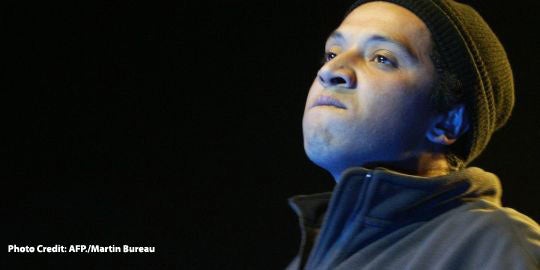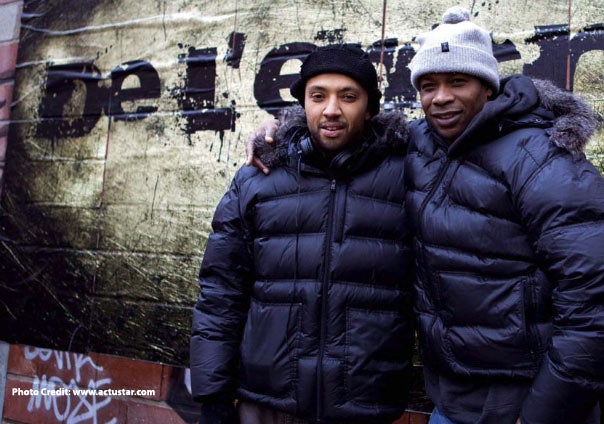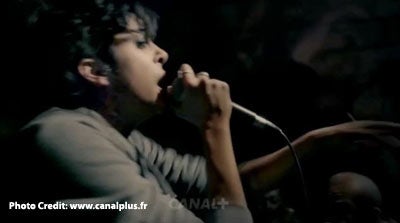 Hamé (Mohamed Bourokba) is a member of the French rap group La Rumeur. Also a writer and filmmaker, Hamé has completed graduate work in film and literature from the Sorbonne, later receiving a scholarship to study film for a year at New York University’s Tisch School of the Arts. Je ne suis pas le gardien de mon frère (‘I am not my brother’s keeper’), his first short film, received the support of CNC and French TV channel Arte, and addresses the subject of post-colonial immigration. His original film De L’encre, written with fellow La Rumeur member, Ekoué, premiered to critical acclaim on French television in 2011.
Hamé (Mohamed Bourokba) is a member of the French rap group La Rumeur. Also a writer and filmmaker, Hamé has completed graduate work in film and literature from the Sorbonne, later receiving a scholarship to study film for a year at New York University’s Tisch School of the Arts. Je ne suis pas le gardien de mon frère (‘I am not my brother’s keeper’), his first short film, received the support of CNC and French TV channel Arte, and addresses the subject of post-colonial immigration. His original film De L’encre, written with fellow La Rumeur member, Ekoué, premiered to critical acclaim on French television in 2011.
Earlier this spring, Ethan Philbrick (ADS Works curatorial assistant) and Hamé connected over email to talk about De L’encre, Hamé’s upcoming projects, the Egyptian Revolution, and the challenges of the culture industry. This is the second piece in a series of interviews that will be conducted with current ADS Works fellows. Over the next few months, we will be posting these conversations in hopes of cultivating a more sustained dialogue about artistic excellence and social change. Check out the conversation below!
Ethan Philbrick: I’ve been reading a bit about De L’encre on the web. Can you talk about your inspiration for that project? How did you develop the character of Nejma? What sorts of social issues were you looking to address through the series?
Hamé: I wrote De L’encre (From Ink) with my friend Ekoué (with whom I founded La Rumeur in 1995, at age 18). When Canal+ asked us to propose an idea to them for a film dedicated to rap, we already knew that the film would be some sort of homage to underground Parisian hip-hop and its counter-culture. The counter-culture to which we, La Rumeur, have always been attached. So the film would depict a small, precarious and divided artistic community that is struggling with the question of money offered by the Industry.
From that premise, the characters were born very quickly. Nejma first of all. She’s a young woman because we wanted to examine the minority of the minority. A woman in the very masculine world of underground rap. But also a sort of young wolf, a little thief driven by a strong survival instinct. And surrounding her, her mother, crippled by debt ; her father in conditional freedom, an electronic bracelet around his ankle ; her friend the beatmaker Romuald, possessive and macho ; Pat the artistic director, seducer and cynic, and her boss De Mayrand. After a few days of writing, our system of characters was already in place. I should mention that every character in the film is a quasi-realistic depiction of a real person.
The thematic device of ghost writing appeared very early as well. We wanted to show what happens behind the scenes. How the industries lie and can create fake artists. Everything develops and unravels around the buyer’s need for authenticity, and the deception that is a young female rapper writing lyrics for a huge substance-less hip-hop mogul – a young woman whose job is to stay a ghost and give the rights to her creations to the recording house because they pay her. Ghost writing is very badly received in French rap. A rapper who doesn’t write their own lyrics, who doesn’t compose from their own interior struggles, is a shit! Ghostwriting is therefore even more interesting from a playwriting point of view because it has to stay secret, hidden, deadly quiet.
 Philbrick: What was your experience of the process of creating De L’encre? What are some of the challenges (and also exciting possibilities) of working within television?
Philbrick: What was your experience of the process of creating De L’encre? What are some of the challenges (and also exciting possibilities) of working within television?
Hamé: We wrote De L’encre in 5 months, shot in 18 days and edited in 8 weeks. This made every moment challenging and there was constant pressure. And at the same time that we were finishing the script, there was casting, location scouting and cutting to finish as well.
Working in such a tight environment, in the urgent rhythm of television without any real period for slowing down made us feel like we were on a tightrope above a gorge. Especially because we had something to defend – a world, a specific opinion and vision about our music. Everything wasn’t ready on the first day of shooting; we had to improvise things, especially the staging and the selection of frames. There, necessity and effectiveness were the governing principles. Hence the filming on the shoulder, the long shots, the games with mirrors to embrace the space from one axis, etc.… The essential thing was, above all, to privilege our direction of actors and then adapt the frame to what the actors were doing and clarify with it, favoring natural contrasts.
With this film, and for the first time, we touched a huge public: about 30 airings for 2 million viewers. We only reach 150,000 people with our music, without even talking about the government censorship where we paid a price (see trial against Nicolas Sarkozy).
 Philbrick: Anna has written about the challenge that “the bigger you are broadcast, the more compromises you face.” Are you experiencing that dynamic? How do you maintain your political integrity as you make art within industries?
Philbrick: Anna has written about the challenge that “the bigger you are broadcast, the more compromises you face.” Are you experiencing that dynamic? How do you maintain your political integrity as you make art within industries?
Hamé: On the whole, we were able to make the film we wanted to make. There were strong pressures and attempts to make us write consensual things at first. We gave nothing up, point by point, and finally the Canal+ channel trusted us. We were also helped in this respect by the fact that well-known talented actors such as Béatrice Dalle and Réda Kateb joined the film because they knew and respected La Rumeur’s work. We used our reputation of being independent artists that had been attacked by the State as a label for ourselves.
The film was awarded twice at film festivals (nominated for French Film Awards: Best Feature-Length French-Speaking Film, and Audience Pick at the Geneva International Festival). [It was] so liked that Canal+ wants to make our next film, this time for the cinema.
Philbrick: What inspires you? What outrages you?
Hamé: I’ll answer both questions with the same event – the Egyptian revolution. There are plenty of reasons to be both inspired and also fear the worst. I am very close to these recent evolutions. It’s incredible what is happening there. The question is: will the process achieve real progress for the people or even the army, backed by Islamists and supported by the West, or will it re-instate that which it destroyed – dictatorship. The historical sequences for this part of the world are extremely uncertain. The geopolitical stakes are immense and are in direct opposition – for the Arab people, for the United States, for Israel, for China or Iran. I have a feeling that, in this region, the genetic code of the 21st century is in the middle of developing, with a high risk of rushing head first into a huge confrontation.
Philbrick: What are you working on right now? What are your current and upcoming projects? Any exciting plans for the future?
Hamé: I just finished a short film, which will compete very soon in festivals, notably at Cannes. Also, with La Rumeur, we just finished our 4th album. We’re leaving to tour France and Europe from May until September 2012, with a huge concert at L’Olympia in Paris planned for October.
We have a project in the years to come, in addition to our music and our next feature film in progress: create the first school in France for ghetto film…
translation by Sophia Shackleton

